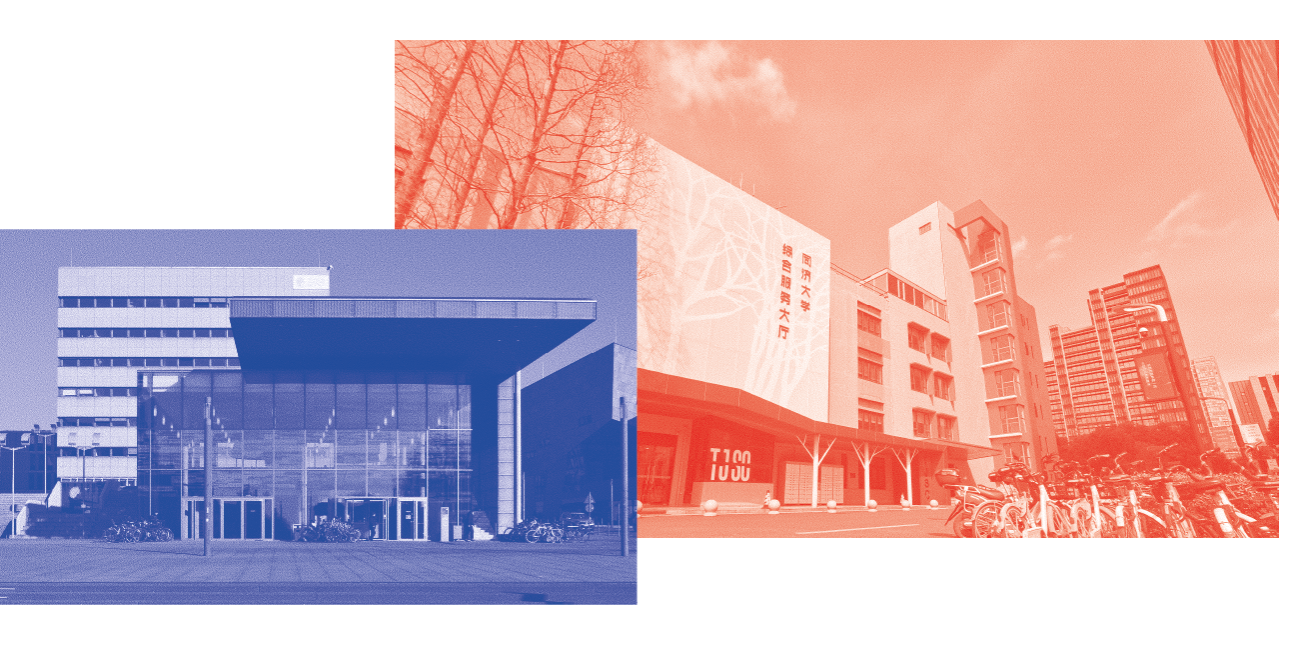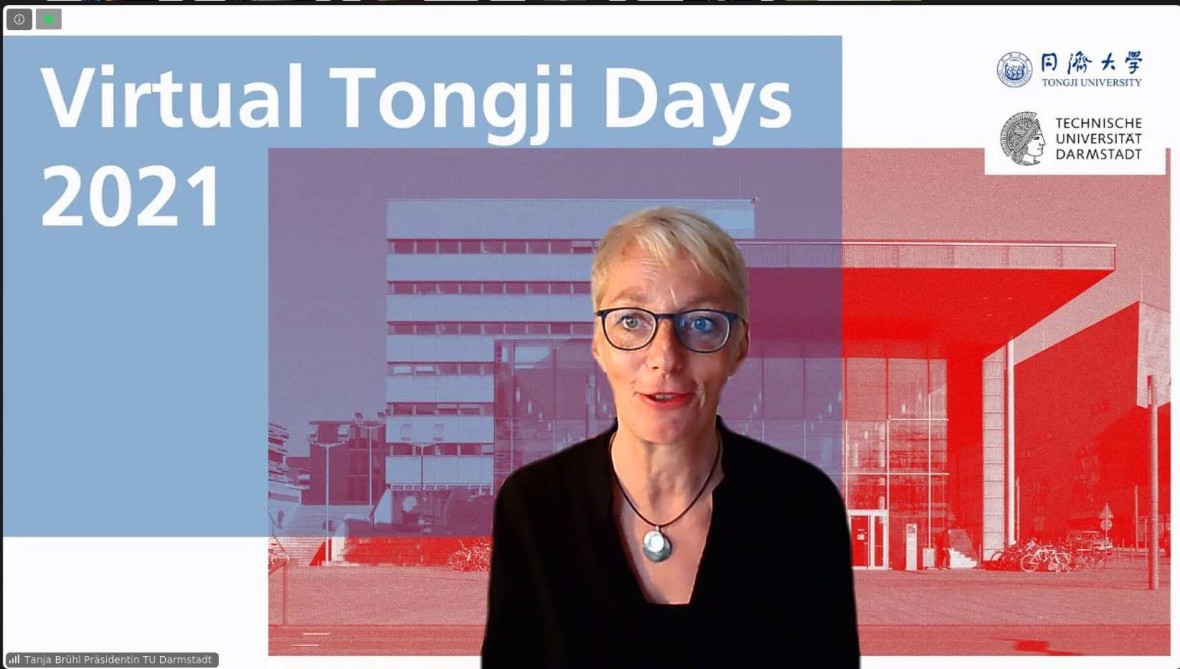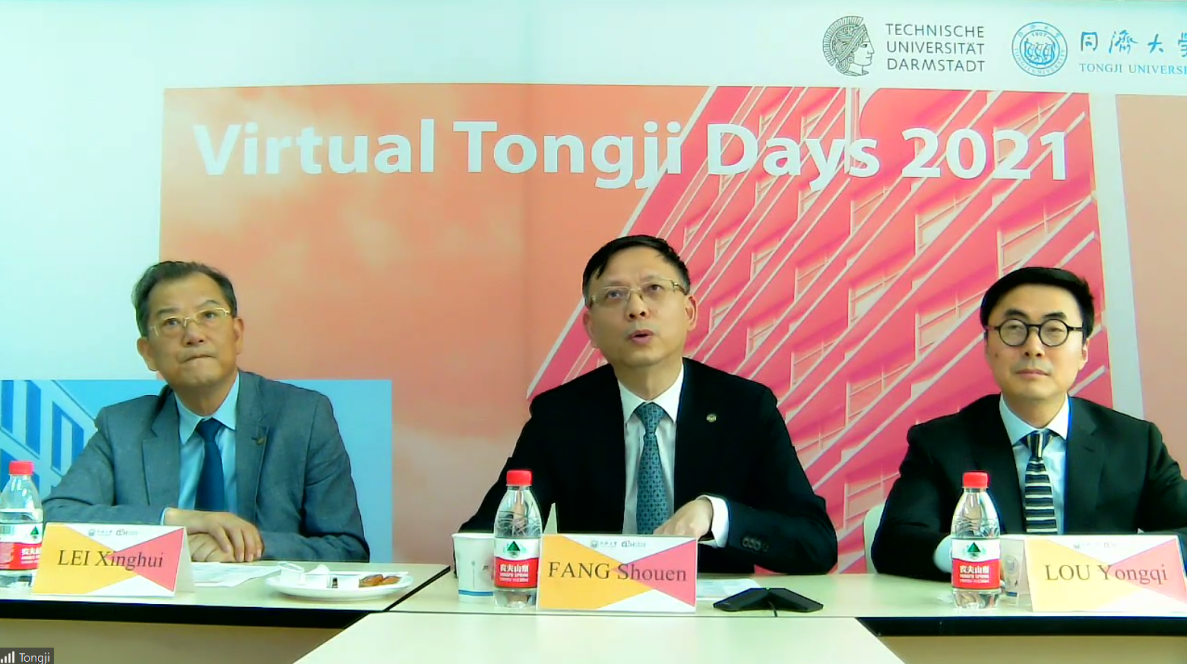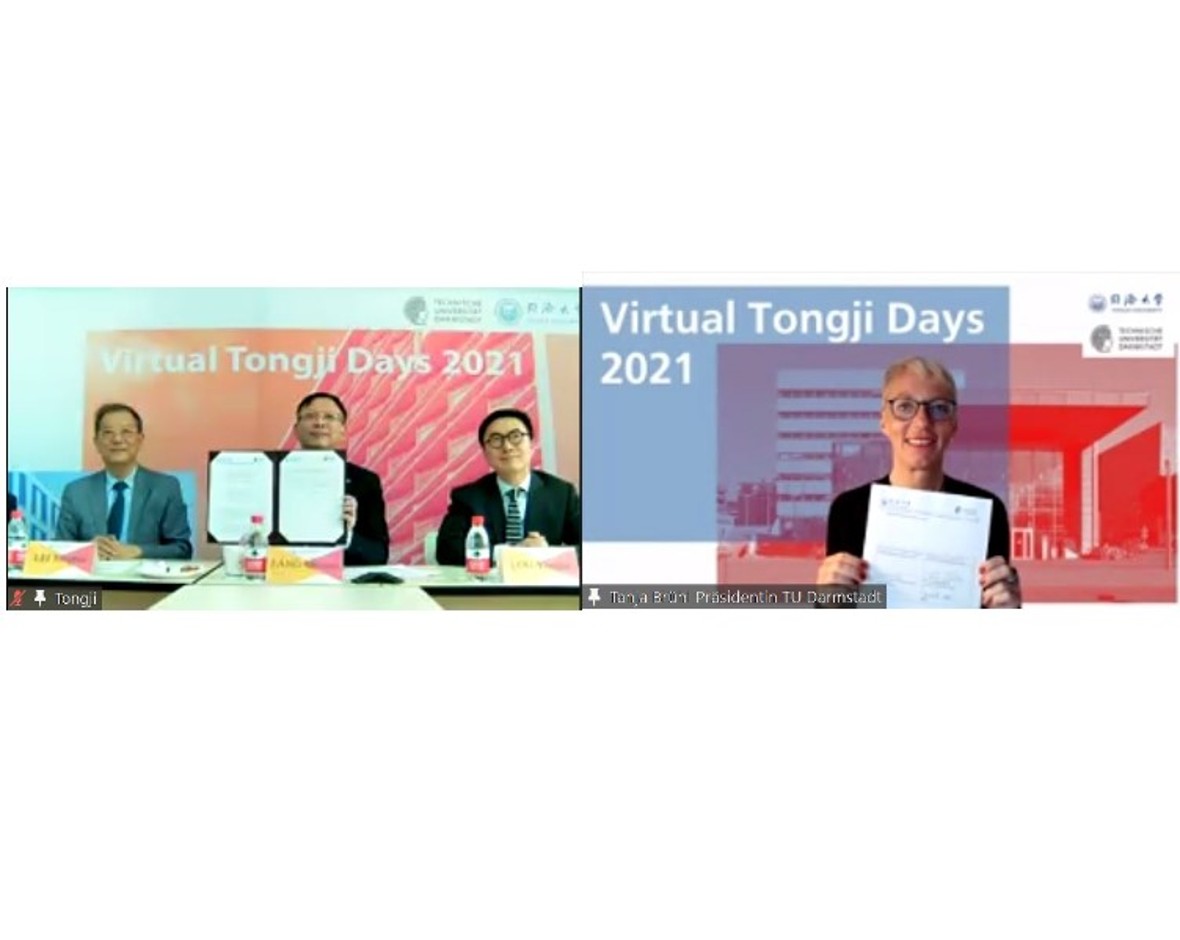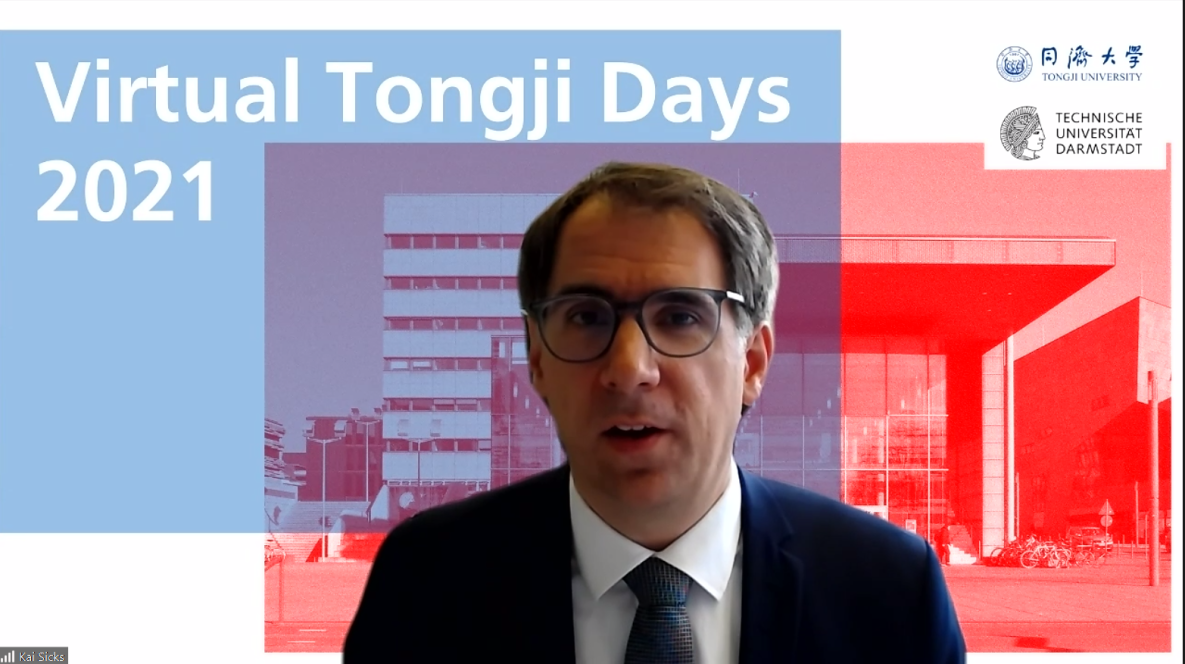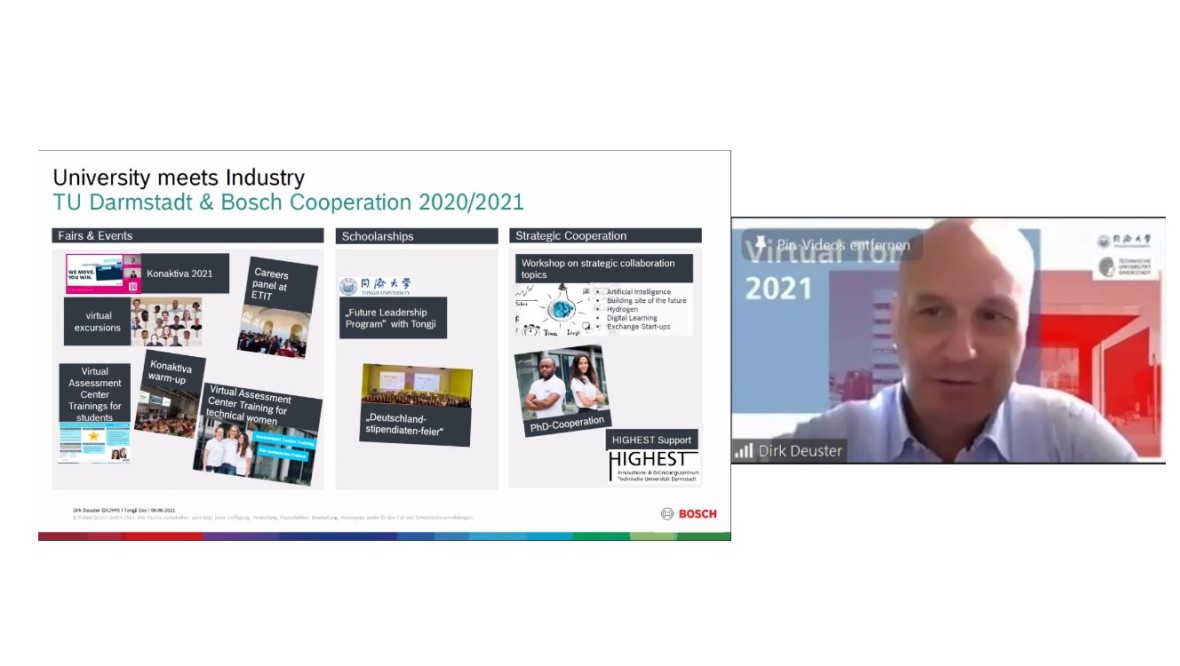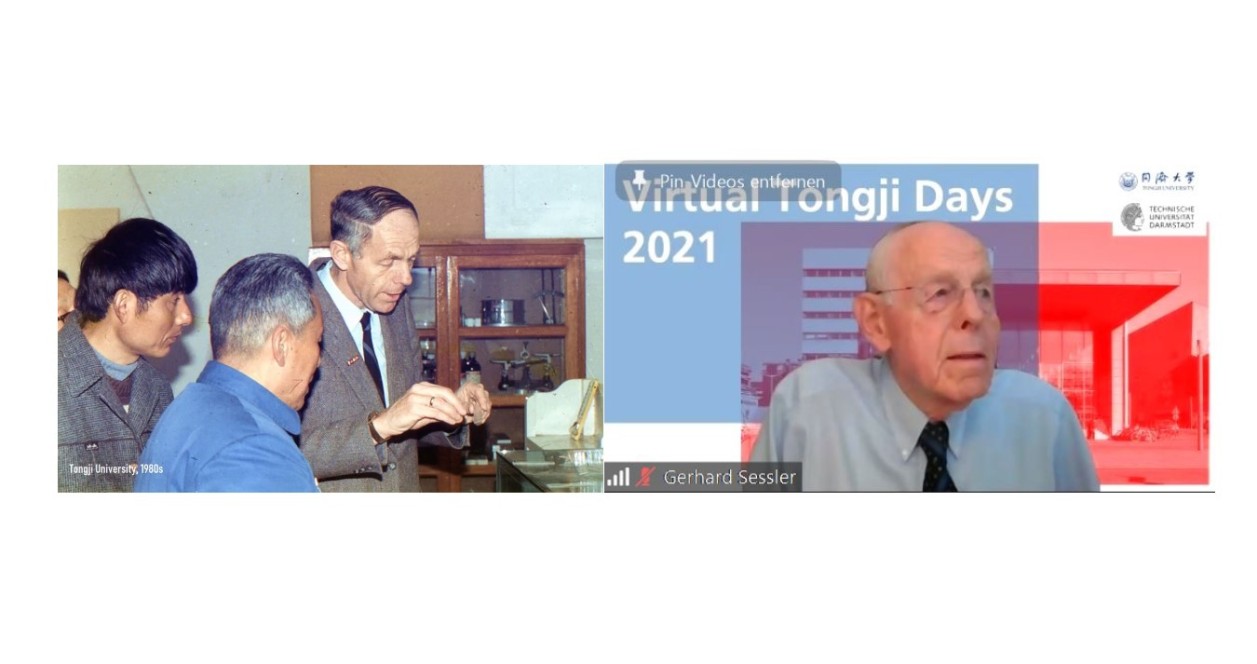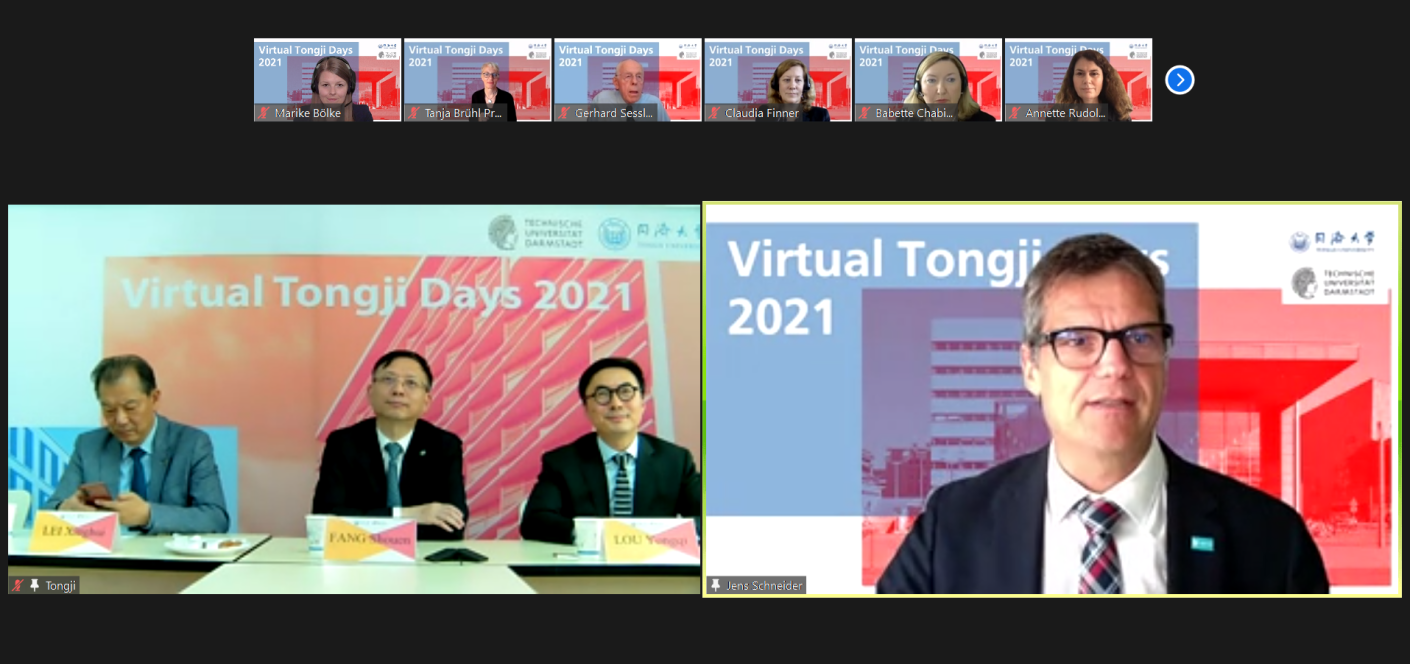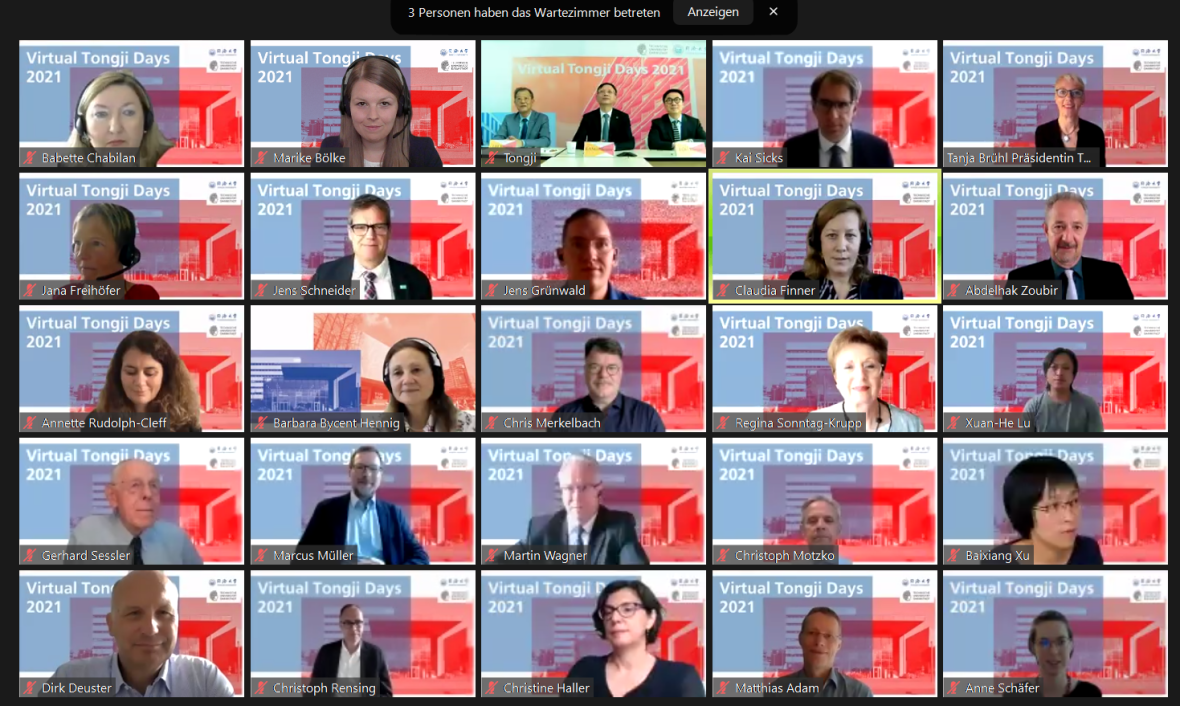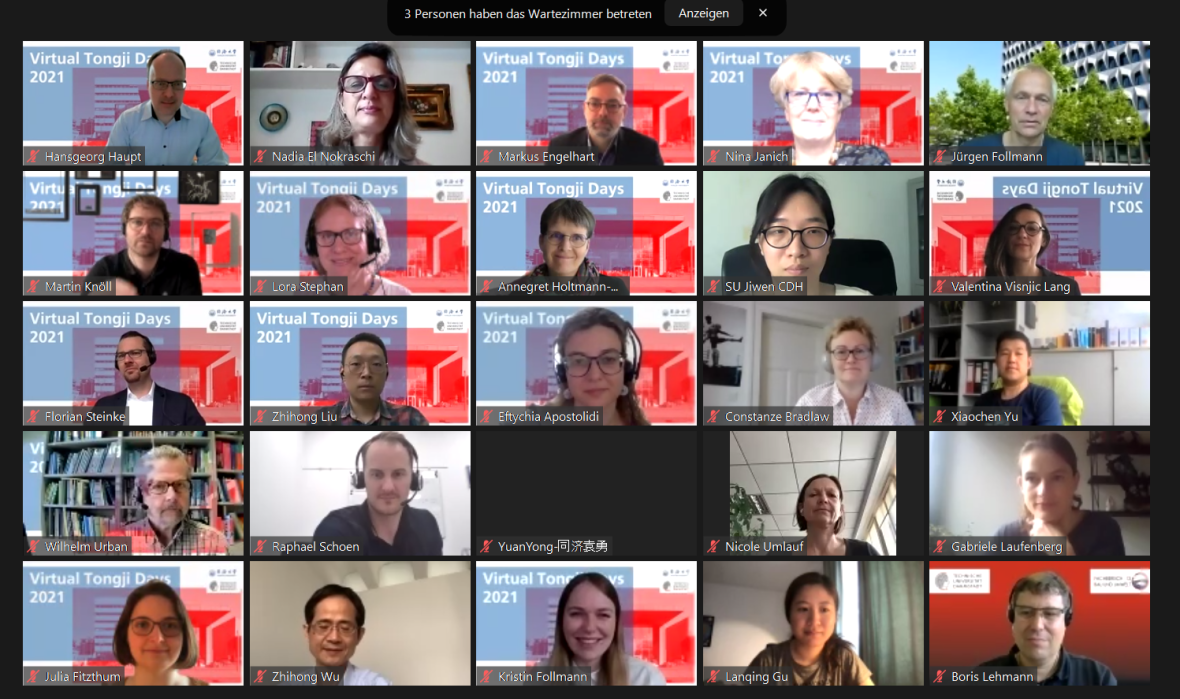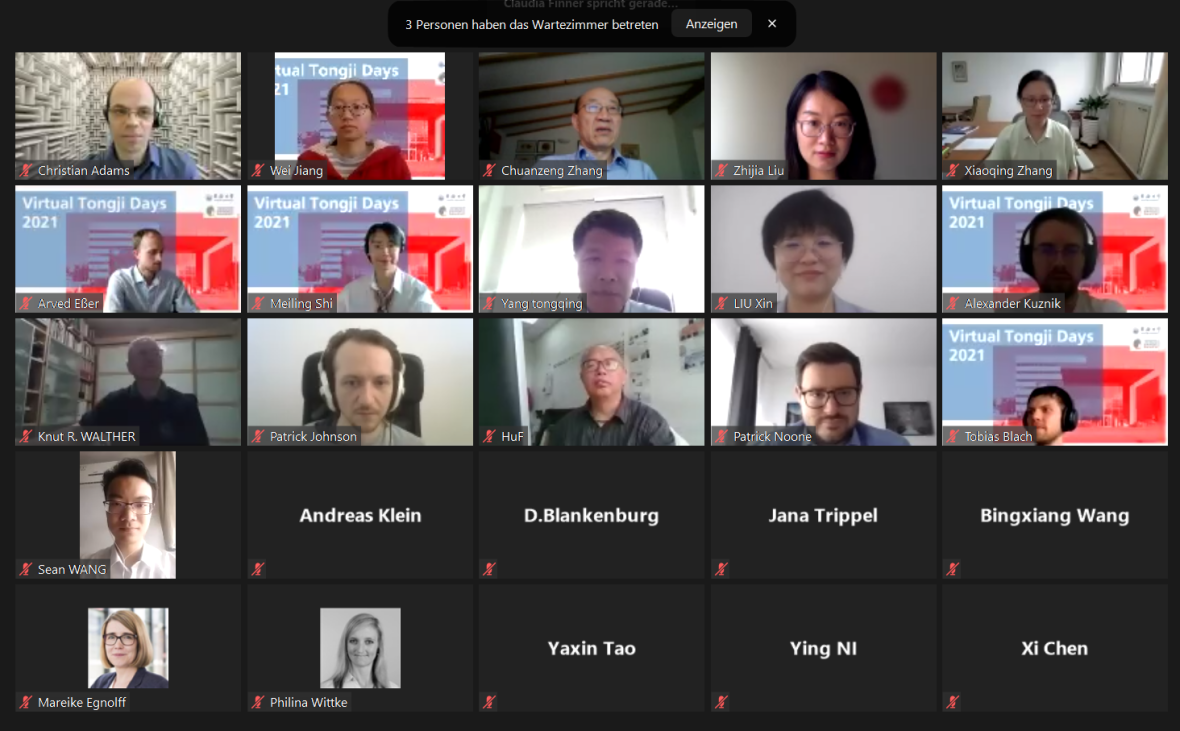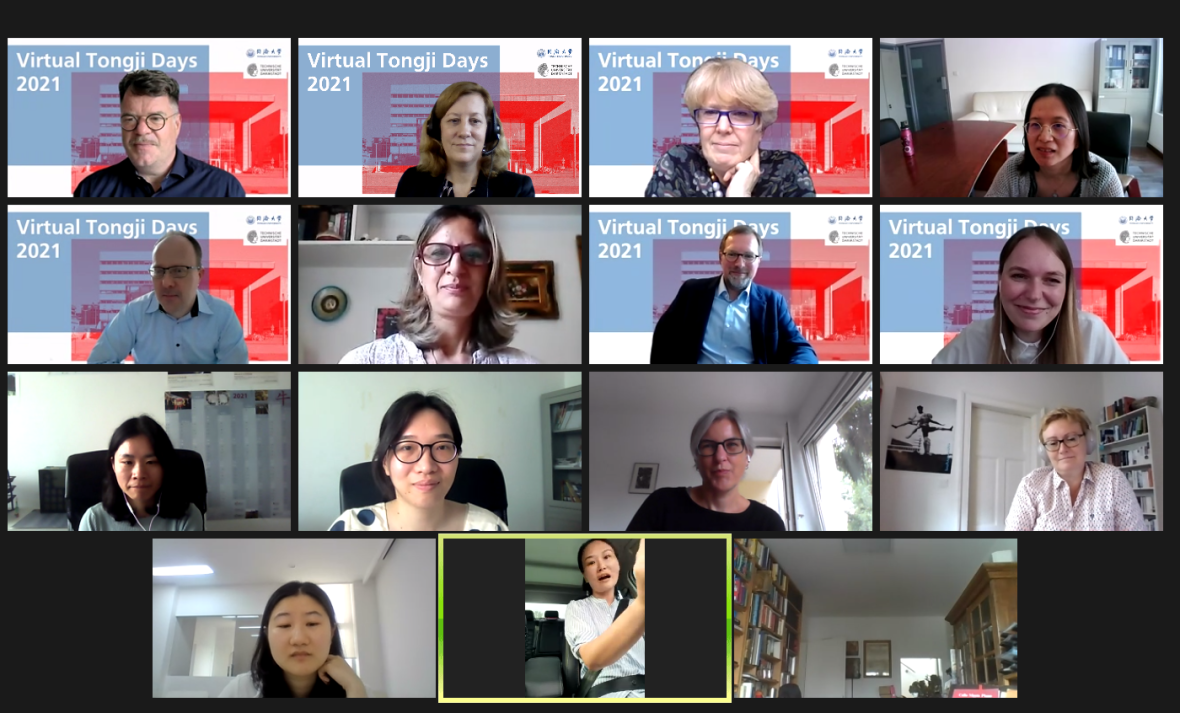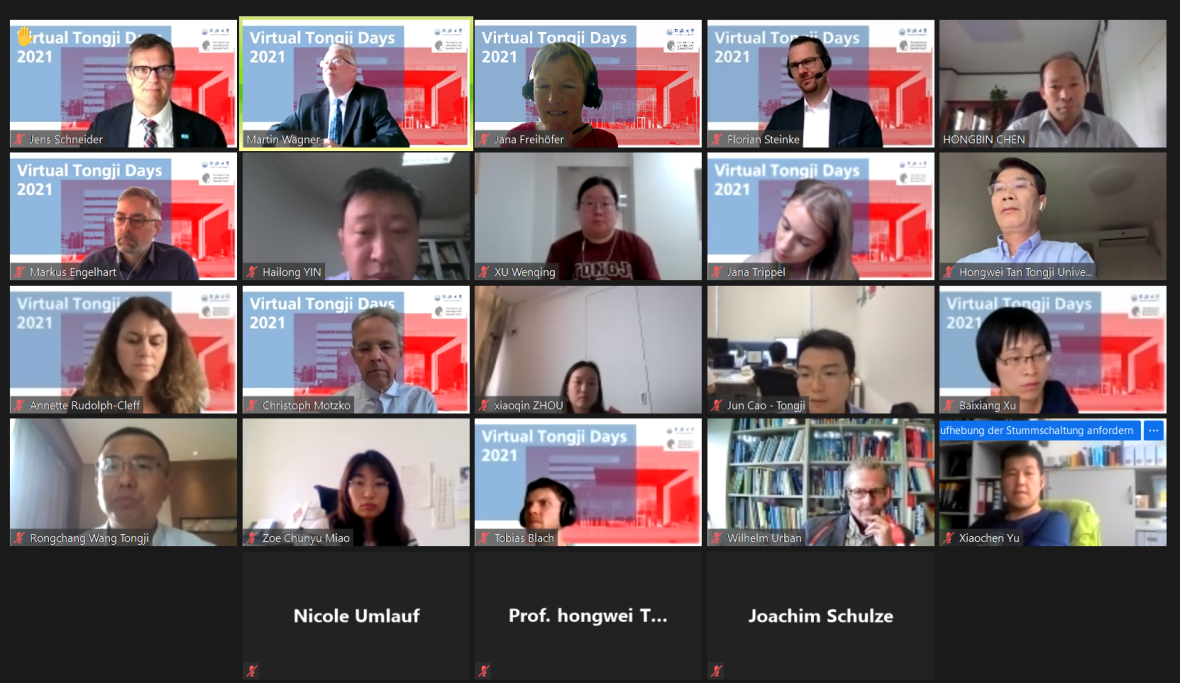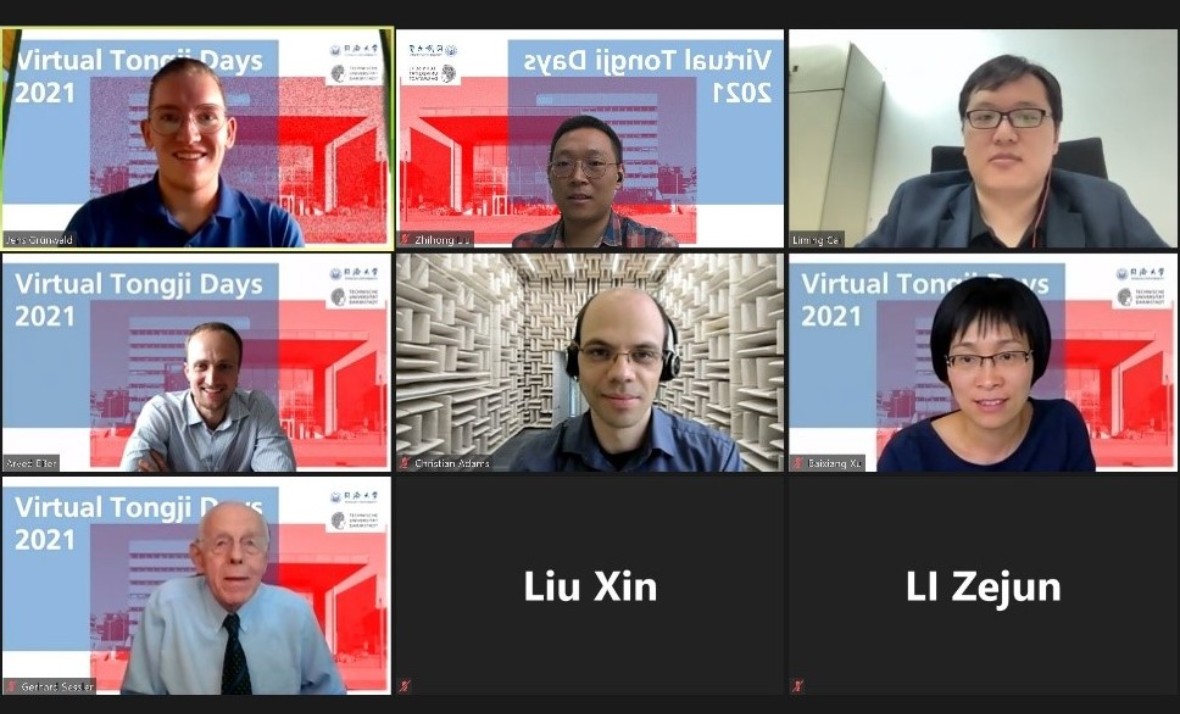Celebration of 40+ years of partnership between Tongji University and TU Darmstadt
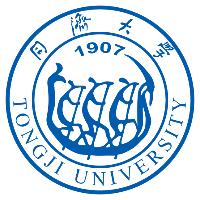
On June 8 and 9 2021, Tongji University and TU Darmstadt celebrated their cooperation with the Virtual Tongji Days.
The event was opened with a festive ceremony which focused on the successful cooperation of more than 40 years and many projects that resulted from this collaboration. The festive ceremony was followed by three interdisciplinary networking sessions.
On the following day, partners from both universities worked together in 9 different workshops and summarized their results during the closing session. This occasion was a great opportunity to formulate ideas and plan for the future growth of a key academic relationship.
-
![]()
Welcome and Greeting by Prof. Tanja Brühl, President, Technical University of Darmstadt -
![]()
Greeting by Prof. FANG Shouen, Chairman of University Council, Tongji University -
![]()
Signing MoU by Tongji University and Technical University of Darmstadt -
![]()
Greeting by Dr. Kai Sicks, Secretary General, German Academic Exchange Service (DAAD) -
![]()
Keynote by Dirk Deuster, Senior Vice President Human Resources, Bosch-Rexroth -
![]()
Prof. Sessler, Technical University of Darmstadt -
![]()
Overview of current and future cooperation by Prof. Dr. Jens Schneider, Vice President, TU Darmstadt and Prof. LOU Yongqi, Vice President, Tongji University -
![]()
Group photo 1 of festive ceremony -
![]()
Group photo 2 of festive ceremony -
![]()
Group photo 3 of festive ceremony -
![]()
Networking Session „Language & Culture“ -
![]()
Networking Session „Energy & Environment“ -
![]()
Networking Session „Mechanical Engineering & Computer Science“
- Go to picture 1
- Go to picture 2
- Go to picture 3
- Go to picture 4
- Go to picture 5
- Go to picture 6
- Go to picture 7
- Go to picture 8
- Go to picture 9
- Go to picture 10
- Go to picture 11
- Go to picture 12
- Go to picture 13
Welcome and Greeting: Prof. Tanja Brühl, President, Technical University of Darmstadt
Greeting: Prof. FANG Shouen, Chairman of University Council, Tongji University
Signing Memorandum of Understanding: Prof. Tanja Brühl and Prof. FANG Shouen
Group photo
Greeting: Dr. Kai Sicks, Secretary General, German Academic Exchange Service (DAAD)
Keynote „University meets industry – Chinese German cooperation”: Dirk Deuster, Senior Vice President Human Resources, Bosch-Rexroth
Slide-Show about the cooperation
Laudation for Prof. Sessler on his 90th birthday and services to the cooperation TU Darmstadt – Tongji University:Prof. LEI Xinghui, Vice President, Tongji University
Reply to honour: Prof. Sessler, TU Darmstadt
Overview of current and future cooperation: Prof. Dr. Jens Schneider, Vice President, TU Darmstadt, Prof. LOU Yongqi, Vice President, Tongji University
Networking Session 1: Virtuelle Kaffeebar – virtual coffee bar: Sprache & Kultur – Language & Culture
Moderators: Prof. Nina Janich, Prof. WU Huiping
Networking Session 2: Energy & Environment
Moderators: Prof. Martin Wagner, Prof. DAI Xiaohu, Prof. CHEN Hongbin, Prof. Florian Steinke, Prof. TAN Hongwei
Networking Session 3: Mechanical Engineering & Computer Science
Moderators: Arved Eßer, Prof. CAI Liming
9 workshops and closing plenary of the workshop sessions:
Prof. Bai-Xiang Xu (TU DA), Pof. YANG Tongqing (Tongji University)
Functional materials and structures play important roles in the modern technologies as actuators, sensors, and energy converters. They manifest themselves by intelligent response to multiphysics stimulus. TU Darmstadt is very active and successful in this field, particularly on functional ceramics and polymer as well as energy materials. Since a few decades bilateral collaboration has been initiated and consolidated on the related research topics between Tongji University and TU Darmstadt, and has involved colleagues with different disciplines. In the present workshop you will be introduced to the current on-going cooperation on the topics of dielectrets, ferroelectrics and rechargeable batteries, which has been funded on either land or national level. We strive also for a strategical discussion on further possibilities of cooperation and project initiatives.
Prof. Martin Wagner (TU DA), Prof. DAI Xiaohu (Tongji University)
Smart Cities are urban areas, where a range of data is collected with electronic methods and sensors. Data collection from citizens, buildings and institutions is used to manage e.g. transportation systems, utilities, power plants, schools and hospitals. In the workshop Smart Cities new water infrastructure concepts will be introduced. Another topic is resilience of smart cities as well as the necessity of land management of smart cities. Finally, examples of monitoring systems for smart cities, Smart energy storage in underground structures, and existing smart water cities in China will be illustrated.
Prof. Stephan Rinderknecht, Prof. Christian Beidl, Prof. Gerd Jürgen Griepentrog, Dr. Bernd Lenzen, Arved Eßer (TUDA), Prof. ZHONG Zaimin, Prof. ZHAO Zhiguo (Tongji University)
Future mobility is a key factor in reforming the energy and transport sectors and ensuring long-term climate protection. Fossil-fuel-based propulsion is being replaced by electromotive machines, which is revolutionizing the automotive industry and will lead to a new form of automobility. To connect major international mobility players, the session “Future Mobility in China & Germany” brings academic professionals from Germany and China together into one virtual space to share their experiences, challenges and achievements in this dramatically changing sector. Professor C. Beidl (TU Darmstadt) will comprehensively interpret the real driving efficiency of the conventional and innovative propulsion systems. Professor Z. Zhong (Tongji University) focuses on the innovative rotor position sensing for enhancing the control reliability in electric traction applications. Afterwards, Professor Z. Zhao (Tongji University) will introduce an adaptive optimization control for PHEVs (Plug-in hybrid electric vehicles). Professor G. Griepentrog (TU Darmstadt) is then going to give us an introduction of the model predictive control strategy for electric drives. Finally Professor S. Rinderknecht (TU Darmstadt) will explain a smart contribution to E-mobility based on the universal hybrid electric vehicles.
Prof. Manfred Boltze (TU DA), Prof. LI Keping (Tongji University)
This workshop will dignify the cooperation of Tongji University and Technische Universität Darmstadt in the field of transport planning and traffic engineering which started in the early 1980ies, already. After highlighting the early cooperation of Prof. Hans-Georg Retzko and Prof. Peikun Yang, joint activities of Prof. Keping Li and Prof. Manfred Boltze in research, conferences and doctoral education will be recalled. Recent developments and current research at the TU Darmstadt Institute of Transport Planning and Traffic Engineering and at the Tongji University School of Transportation will be presented with a focus on bicycle transport. Finally, needs and options for future research and cooperation will be discussed.
Prof. Hans-Christian Pfohl, Prof. Ralf Elbert, Prof. Christoph Glock (TU DA), Prof. HUO Jiazhen, Prof. DUAN Yongrui (Tongji University)
Information technology has always been an important driver of the development of logistics (supply chain management). The theoretical basis of the logistics concept is the systems theory. Therefore logistics decisions have to be based on a holistic approach. The consequence is the high complexity of logistics decisions. Information technology has always been seen as an “enabling technology” to deal with such a complexity.
The technological push in information technology which is based on raising computer capacity and faster information exchange offers new potentials for increased efficiency. Finally this leads to “data-based supply chains” or “smart logistics”. It is part of “The Fourth Industrial revolution” which is characterized by the convergence of breakthrough technologies like Internet of Things (IoT), Artificial intelligence (AI), Advanced Robotics, Enterprise Wearables and Additive Manufacturing. Typical digital applications in the supply chain are Integrated Planning and Execution, higher visibility in the supply chain, prescriptive Supply Chain Analytics or smart warehousing. The results of such applications are not only more efficient procedures but may also lead to new business models.
The Workshop deals with four research projects, two of Tongji University and two of Technical University of Darmstadt, as typical examples for smart logistics.
Prof. Jens Schneider, Harald Holzer (TU DA), Dr. YI Chen (Tongji University)
A seamless transfer of ideas, methods and technologies from science into practice to foster innovations – that is one important key factor for the sustainability of economies.
Creating the best conditions for scientists, students, investors, the economy and the entire ecosystem and thus the development of a seamless innovation network is yet another key factor.
The workshop serves as an exchange of information between the start-up- and innovation activities of Tongji University and TU Darmstadt based on best practise. This will enable us to develop an international innovation network between Shanghai/ China and Darmstadt/ Germany located in the heart of Frankfurt-Rhein-Main area.
Prof. Nina Janich, Prof. Marcus Müller (TU DA), Prof. ZHAO Jin (Tongji University)
The workshop will give an insight into the research of applied linguistics at both universities. The German Department of Tongji University and the Institute of Linguistics and Literary Studies at TU Darmstadt have been closely connected for many years. The exchange occurs on all levels: teaching, scholarship as well as scientific research. Both institutes share a focus on the analysis of language as a trace of (inter)cultural interactions in various social domains such as politics, science or economics. The main interest is therefore the relationship between language, knowledge and society. In the workshop, young researchers from both universities will present their current research and exchange ideas.
Prof. Birgit Ziegler (TU DA), Prof. WANG Jiping (Tongji University)
Researchers from the Institute of Vocational Education (IBB) at Tongji University will give short introductory presentations on current developments and challenges in vocational education in China, specifically on the following topics:
1. Modernization of the vocational education system in terms of expansion and permeability
2. Modernization of vocational profiles and integration of digitalization
3. Challenges and concepts of Teacher education for vocational schools
This will be followed by an exchange on the development of research-related cooperation projects on these focal topics. In addition, the continuation and the format of the Chinese-German workshops on vocational training research will be discussed.
Prof. Jens Schneider, Prof. Ulrich Knaack (TU DA), Prof. CHEN Suwen (Tongji University)
Tongji Darmstadt Glass + Facade Seminar 2021 (opens in new tab)
Glass is super a nice material and perfect for transparency in the build environment. And it is an really engineering trigger, being a material, not giving any warning before breaking! So: more research!
In relation to the shared research and educational activities of Prof Dr. Suwen Chen / Tongji University and Prof Dr. Jens Schneider and Prof Dr. Ulrich Knaack, both TU Darmstadt, we are organizing this 2021 issue of the Glass + Façade Seminars: Themes will be structural use of glass, the interaction of glass with interlayers, the potentials of printing glass and the new build Glass Competence Center. Next to short lectures brainstorming workshop will be held to interstage future research themes and potentials for cooperation.
Prof. Schneider and all workshop organizers will sumarize the results of their workshops. Join us to get an overview of upcoming collaborations between Tongji University and TU Darmstadt in various fields.
Speakers
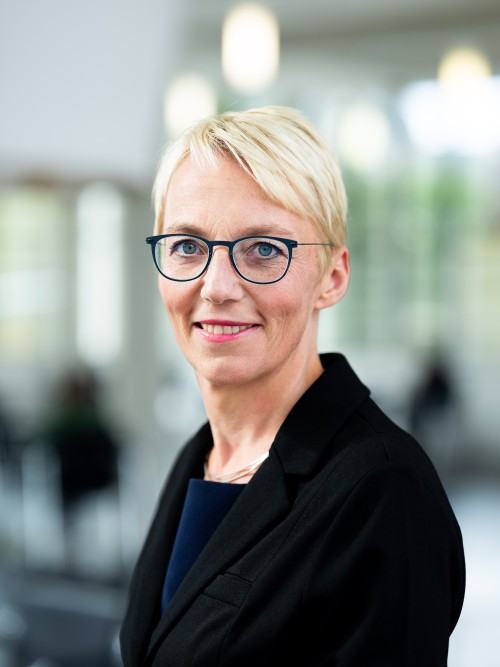
Tanja Brühl
President of Technische Universität Darmstadt and CLUSTER
Prof. Dr. Tanja Brühl is president of Technische Universität Darmstadt. Before coming to Darmstadt in October 2019, she was professor of political science (2007-2019) and vice president of academic affairs (2012-2018) at Goethe University Frankfurt.
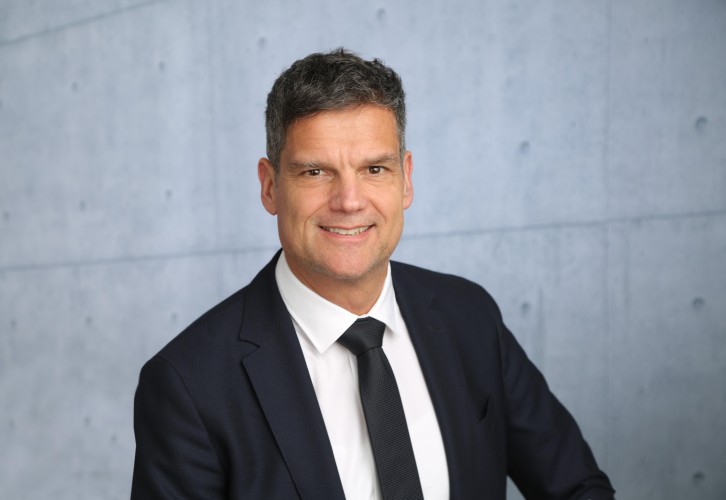
Jens Schneider
Vice President for Transfer and International Affairs of Technische Universität Darmstadt
Prof. Dr.-Ing. Jens Schneider is professor for Structural Analysis at Technical University Darmstadt, at the Institute of Structural Mechanics and Design, Department of Civil and Environmental Engineering. Since 2020, Jens Schneider is Vice President for Transfer and International Affairs and is currently leading the development and implementation of new university strategies for internationalization and third mission. Jens Schneider studied civil engineering at TU Darmstadt and Universidade de Coimbra, Portugal. He received his PhD in structural engineering from TU Darmstadt in 2001. In his career and as a founder and partner of an engineering office, he realized multiple large-scale construction projects and bridges with a focus on glass and sustainable construction. Jens Schneider joined TU Darmstadt as a full professor in 2009. From 2017 to 2019, he served as Dean of the Department of Civil and Environmental Engineering. His research focuses on (a) glass and polymers in structures, facades, automotive glazing, solar applications, electronics and for additive manufacturing, (b) on fracture mechanics and viscoelasticity as well as on (c) energy efficiency in design and construction, sector coupling and decarbonisation of the building stock. He is strongly engaged in the exchange of research results with society and economy, as for example realized in the full-scale energy efficient “ETA-factory” on the campus of TU Darmstadt.
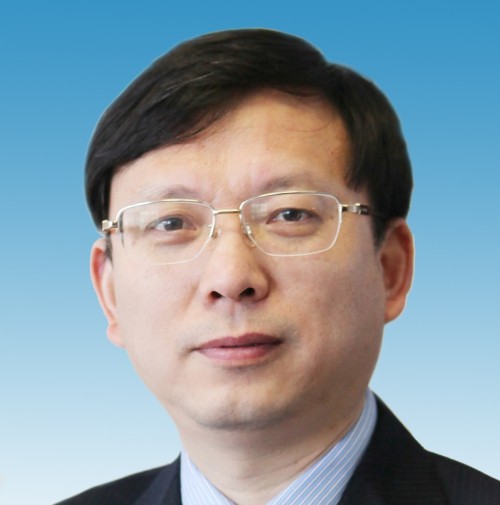
FANG Shouen
Chairman of University Council, Tongji University
Prof. FANG Shouen is currently Chairman of the University Council of Tongji University. He is a full professor in transportation engineering, PhD supervisor, and his research focuses on road security, traffic planning and design theory. Prof. Fang Shouen studied in the College of Transportation Engineering of Tongji University and received all his degrees (bachelor in 1984, master in 1994, PhD in 2000) from Tongji University.
Work Experience:
1997-2000 Director, Road Engineering Department, College of Transportation Engineering, Tongji University
2000-2002 Vice Dean, College of Transportation Engineering, Tongji University
2002-2009 Party Secretary, College of Transportation Engineering, Tongji University
2010-2016 Vice President, Tongji University
2016-present Chairman of University Council, Tongji University
Research Fields:
He coordinated and participated in more than 10 research projects, including “Road Safety Evaluation System based on GIS”, “Road accident black point Identifying method and road security control procedure in Xin Jiang province”, “Road Security Evaluation System in Western Parts of China”, “Guide to Road Security Evaluation Projects”, and etc. He published more than 100 research articles, and as chief editor published <<High Way>>, co-edited <<Road Security Engineering>>, <<Road Planning and Design>>, <<Road Security Engineering>>, <<Computer Aided Road Engineering>> and other manuals and important publications.
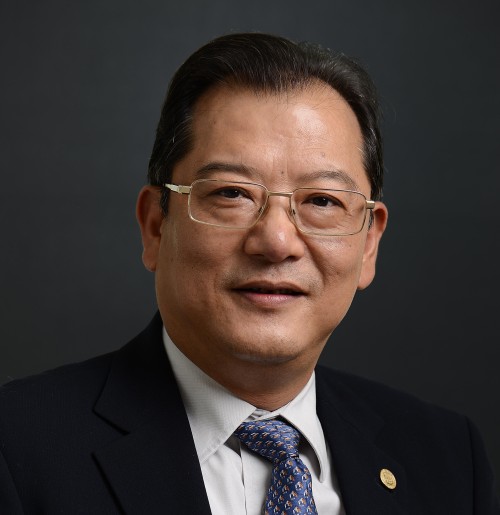
LEI Xinghui
Vice President, Tongji University
About the Person:
1997 –2001 Doctorate in Management Science and Engineering, School of Economics and Management, Tongji University
1986 – 1998 Teacher at School of Economics and Management, Tongji University
1998 – 2000 Deputy Director of Department of Business Administration, School of Economics and Management, Tongji University
2000 – 2007 Vice Dean of School of Economics and Management, Tongji University
2007 – 2011 Director of Office of Alumni Affairs and Development, Tongji University
2007 – 2009 Director of Office of Presidency, Tongji University
2009 – 2017 Executive Deputy Director of Graduate School, Tongji University
Jan. 2017 – Jun. 2017 Assistant to President, Tongji University
Since Feb. 2018 Vice President of Tongji University
Academic Expertise:
- Teaching in finance and financial management, strategic management, risk management;
- Research on corporate governance and capital markets, corporate strategy research, corporate system design, financial corporate management, and investment and financing research on major infrastructure construction projects.
- 4 monographs and textbooks as well more than 100 academic papers have been published based on the above mentioned research results. Two “863 Program Sub-projects”, two “NSFC-Projects”, one “National 11th Five-Years Support Program Sub-projects” and a number of “Shanghai Major Decision-making Consultation Projects” as well as corporate consulting projects have been completed.
- Additional research on teaching and teaching management with numerous publications, awarded with both national and municipal teaching achievement prizes.
Memberships and Offices:
- Vice Chairman of the Education Development Foundation of Tongji University
- Executive Vice Chairman of the Tongji University Alumni Association
- Director of the Postdoctoral Mobile Station for Business Administration of Tongji University
- Director of the Institute of Strategy and Finance of Tongji University
- Membership of the 6th National Steering Committee for the Education of Graduate Students of Business Administration
- Membership of the National Steering Committee for Teaching in Business Administration
- Membership of the 6th Council of China Academic Degrees and Graduate Education Association
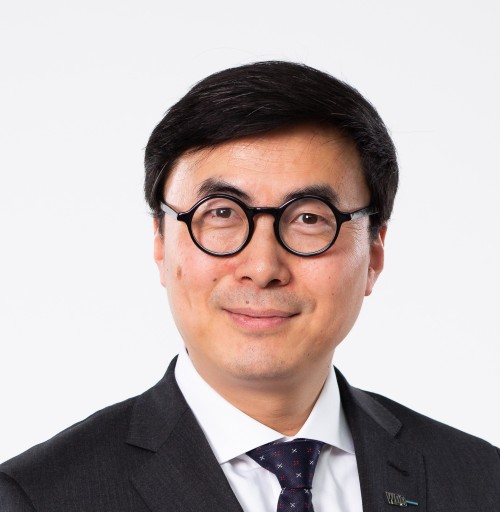
LOU Yongqi
Vice President, Tongji University
Prof. Dr. Yongqi Lou has been served as Vice President (International) of Tongji University since January, 2021. Lou is Dean of the College of Design and Innovation at Tongji University in Shanghai, the Board Director of World Design Organization (WDO) and the Vice President of China Industrial Design Association. Lou has been the pioneer in China for design-driven innovation education, research and practices that connect design, business, and technology. He is the founder of Design Harvests, a design-driven urban-rural interaction project; Tongji-Huangpu School of Design and Innovation, the first design thinking K12 school in China; and She Ji — the Journal of Design, Innovation, and Economics published by Tongji and Elsevier. Lou was the Vice President of CUMULUS, International Association of Universities and Colleges of Art, Design and Media. He is the Editorial Board Member of the journal Design Issues published by The MIT Press, and the Journal of Visual Arts Published by Taylor & Francis. Lou currently chairs the international advisory board of University of Applied Arts in Vienna. He was invited as the keynote speaker in conferences such as BODW 2018, IFI 2017, IDSA 2016, ACM SIGCHI 2015, WDC 2014 Design Policy Conference, IIT Design Strategy 2013 etc. In 2014, the President of Finland honored Lou with the Order of the Lion of Finland as a Knight, First Class. Lou was elected as an international fellow of Royal Swedish Academy of Engineering Sciences (IVA) in 2019.
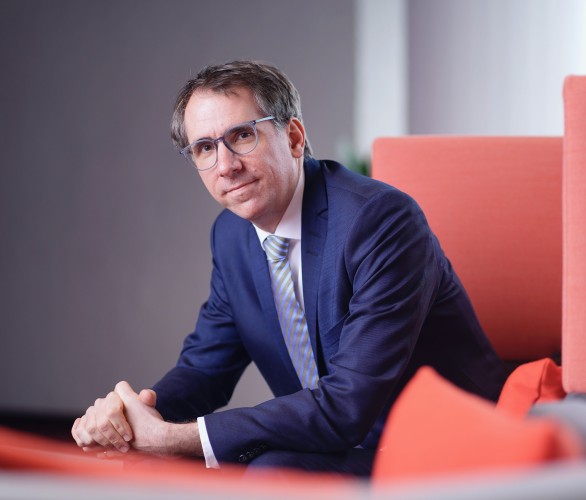
Kai Sicks
Secretary General of the German Academic Exchange Service (DAAD)
Kai Sicks, born 1976, studied German Studies and Political Sciences in Frankfurt/Main, Cologne and Vienna. In 2008 he completed his Ph.D. in German Literary Studies. He was a research scholarship holder at the German Historic Institute in Washington, D.C. and at Cornell University (USA).
From 2008 until 2013 Dr Sicks acted as coordinator of the European PhD Network in Literary and Cultural Studies (PhDnet) at the International Graduate Center for the Study of Culture (University of Giessen) with partner organizations in Bergamo, Helsinki, Lissabon and Stockholm.
In 2013 Dr Sicks became managing director of the Bonn Graduate Center, the central service unit for early-career researchers at the University of Bonn. As of 2017, he was appointed as director of the University of Bonn’s International Office. In this position, Dr Sicks co-authored the University of Bonn’s Excellence Strategy and acted as Bonn’s project manager of the European University of Brain and Technology (NeurotechEU).
In April 2021 Dr Kai Sicks was appointed as Secretary General of the German Academic Exchange Service (DAAD).
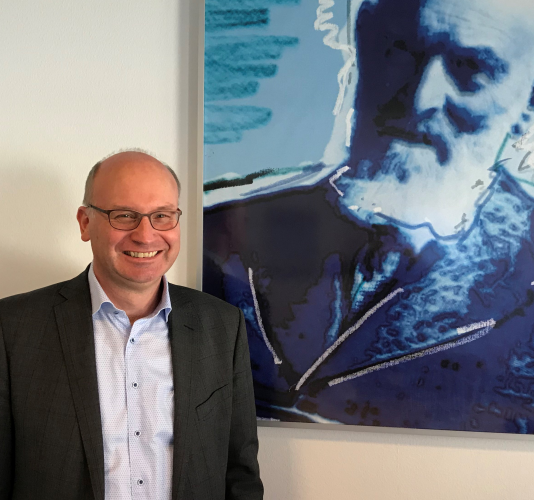
Dirk Deuster
Senior Vice President Human Recources at Bosch Rexroth
Dirk Deuster joined the Bosch Group in 1991 after graduating as an industrial engineer from the University of Karlsruhe. He subsequently held various leadership position in human resources at Bosch. From 2012 to 2016, Deuster was responsible for Bosch’s continuing education programs as director of the “corporate university” – Robert Bosch Kolleg – and of the Bosch Training Centers. In 2016, he became Senior Vice President Human Resources at Bosch Rexroth AG. Deuster manages Bosch’s cooperation with TU Darmstadt.
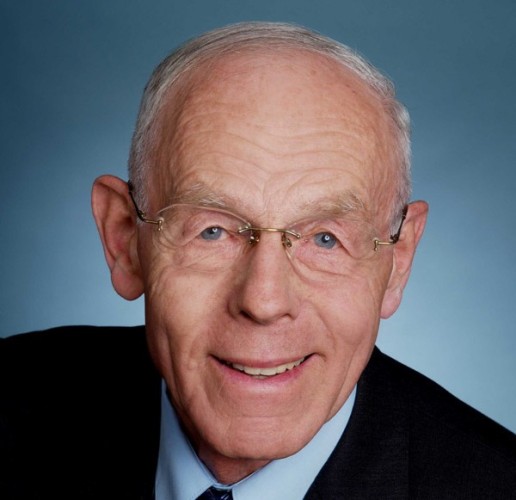
Gerhard Sessler
Professor Emeritus, Department for Electrical Engineering and Information Technology, TU Darmstadt
Gerhard Sessler wurde am 15. Februar 1931 in Rosenfeld geboren. Er studierte Physik in Freiburg, München und Göttingen, wo er 1957 sein Diplom absolvierte. 1959 promovierte er in Göttingen zu einem Thema über Schallausbreitung in dissoziierenden Gasen.
Kurz nach seiner Promotion wechselte er in die USA und forschte dort bei den Bell Laboratorien, wo er von 1967 bis 1975 Leiter der Acoustics Research Abteilung war. Zusammen mit seinem Mitarbeiter James E. West erfand er 1962 das Folien-Elektretmikrofon, auf das 1964 ein Patent erteilt wurde. Elektretmikrofone hatten dann in den folgenden Jahrzehnten einen Anteil von 90 Prozent an allen produzierten Mikrofonen und fanden sich zum Beispiel in Telefonen, Handys, Camcordern und Hörgeräten.
1975 wurde Gerhard Sessler auf die Professur für Elektroakustik am Fachbereich Elektrotechnik und Informationstechnik (etit) der TU Darmstadt berufen. Dort entwickelte er mit seinen Mitarbeitern in den 1980er Jahren das Siliziummikrofon, auch als MEMS- (Micro Electro Mechanical System) Mikrofon bekannt. Dieses hat das Elektretmikrofon heute teilweise abgelöst und wird vor allem in Mobiltelefonen eingesetzt.
In den Jahren 1976 und 1977 sowie 1989–1990 war Professor Sessler Dekan des Fachbereichs etit. Auch nach seiner Emeritierung 1999 leitet er dort die Forschergruppe Elektroakustik.
Professor Sessler ist Mitglied der Deutschen Akademie der Technikwissenschaften (Acatech) und der Heidelberger Akademie der Wissenschaften und wurde außerdem 1999 in die National Inventors Hall of Fame der USA berufen. Zu seinen zahlreichen Auszeichnungen zählen die Benjamin-Franklin-Medaille des Franklin Instituts (2010), der James Clerk Maxwell Award von IEEE/Royal Society of Edinburgh (2012) und das Bundesverdienstkreuz am Bande (2016).

